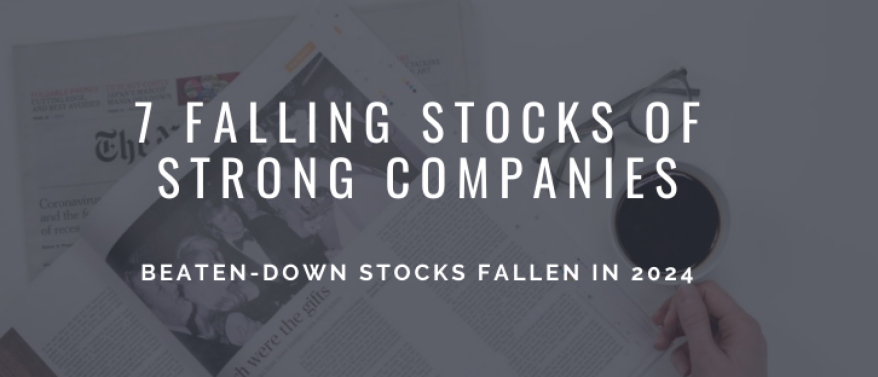Transcript of the best dividend stocks for 2024:
Hello and welcome back to Business Investors, where we delve into the world of dividend stocks. Today, I'm excited to present three dividend stocks that I believe are excellent choices, including one that stands out as potentially the best dividend stock for 2024. Interestingly, I've invested in this stock myself, despite not typically focusing on dividend investments. I see it as undervalued with significant upside potential.
Let's define what makes a great dividend stock. Firstly, it should be undervalued, offering more for your money. Secondly, it should have strong growth prospects. Lastly, it must score high on our dividend scorecard, a tool that assesses the potential for future dividend growth.
In my investing journey, I’ve seen average results initially but have consistently beaten the S&P 500 over the last two years, especially with dividend stocks. Though two years is a short period, my decade of experience lends credibility to my advice. Let's look at the results before diving into the three dividend stocks, the first of which I've personally invested in.
At Happy Investors, my company, we provide investment strategies and stock research. Our track record can be traced back on our platform. Since July 2022, our picks have yielded a positive return of over 37%, outperforming the S&P 500 by 16%. This includes a 4% average dividend, bringing the total annual average return to 41%. For 2023, our dividend stocks slightly underperformed the S&P 500 but offered a higher dividend yield. Overall, we've beaten the S&P 500, with our dividend yield also slightly higher.
Our value stocks have shown impressive results too, with a 40% return, 20% higher than the S&P 500. In 2023, the average return was 17%. For example, Booking Holdings, which I bought in December, has shown promising long-term growth.
Best Dividend Stocks for 2024: Comcast, Oshkosh and Kroger
Now, let's focus on the dividend stocks for 2024. The first is Comcast. While not a standout company, it’s an excellent long-term investment, offering broadband, mobile, and entertainment services. Despite its high profit margins, it's the stock's potential that makes it attractive. Comcast is undervalued based on quantitative analysis, with a low price-to-cash flow and a decent dividend yield. Its growth rate is modest but solid, and it maintains a good net income margin. The return on common equity is strong, making it a compelling long-term investment.
Next, let's talk about Oskosh Corporation. This mid-cap company, known for its machinery and recent foray into electric vehicles, has shown strong sales growth and impressive adjusted earnings per share. With recent acquisitions, it’s building a competitive edge. The valuation is attractive, with a low P/E ratio and promising revenue growth forecasts. Its dividend yield might seem modest, but the payout ratio is low, indicating stability and potential for growth.
Lastly, we have Kroger. This company may not offer the most spectacular growth in terms of profits, but its dividend per share growth is impressive. While its profit margins are low, the return on equity is high. The dividend yield is attractive, and the payout ratio is sustainable. Although the EPS might see a slight decrease, the overall outlook for Kroger is positive, especially for dividend investors.
In conclusion, these stocks, particularly Comcast, offer a blend of value, growth, and dividend potential, making them excellent choices for investors in 2024. While each has its strengths, Comcast stands out for its potential upside and consistent dividend, making it a worthy addition to any dividend investor's portfolio. Remember, the key to successful investing is to analyze each company thoroughly, considering its business model, market competition, and financial health, to make informed decisions that align with your investment goals.
Best Dividend Stock: Comcast
Comcast Corporation, a leading media and technology company, offers a comprehensive analysis that reflects its position in a highly dynamic and competitive industry. The company operates through various segments, including Comcast Cable and NBCUniversal, covering a spectrum of services from high-speed internet and video to news, entertainment, and film production. Its notable presence in the streaming market with Peacock adds to its diverse portfolio.
Financially, Comcast exhibits strong revenue generation across its diversified business units. The analysis of its financial health involves scrutinizing its profitability through various margins, EBITDA, net income, and closely observing its debt management, liquidity status, and cash flow operations. This financial scrutiny helps in understanding the stability and sustainability of Comcast's business model.
Market performance is another critical aspect of Comcast's analysis. The company's stock trends, market volatility, and comparison with industry benchmarks provide insights into its market standing. As a company known for consistent dividend payouts, its dividend history, yield, and payout ratio are particularly relevant for investors focused on income generation. Share buyback programs also offer insights into the company's strategies for enhancing shareholder value.
The growth prospects of Comcast are tied to its strategies for market expansion, product and service innovation, and strategic acquisitions. The company's positioning in the face of competitors in the cable, media, and technology sectors is crucial to understand its potential for growth and market leadership. Valuation metrics like the Price-to-Earnings (P/E) ratio, alongside other financial ratios, play a pivotal role in assessing Comcast's market value and investment attractiveness.
However, Comcast's operations are not without risks and challenges. The company faces regulatory risks, needs to adapt to rapidly changing technologies and consumer preferences, and tackle competition from various fronts, including other cable providers and emerging streaming services. Economic sensitivity is another factor, as fluctuations in economic conditions can significantly impact its business segments.
Environmental, social, and governance (ESG) factors are increasingly relevant in Comcast's business operations. The company's efforts in sustainability, community engagement, and ethical corporate governance practices are crucial in maintaining its reputation and aligning with investor expectations.
In summary, an analysis of Comcast Corporation requires a deep dive into its diverse operations, financial stability, market performance, growth strategy, and valuation. It also necessitates understanding the potential risks and challenges that Comcast faces in a rapidly evolving industry. Regularly updated analysis, considering the latest data and market trends, is essential for investors to gauge Comcast’s ongoing performance and future prospects.
Best Dividend Stock: Oshkosh Corporation
Oshkosh Corporation, a renowned manufacturer of specialty vehicles and vehicle bodies, operates across diverse markets, including defense, fire and emergency, and commercial sectors. The company's business model encompasses multiple segments: Defense, known for tactical vehicles like the JLTV for the U.S. Army; Fire & Emergency, producing fire trucks and emergency vehicles; Commercial, focusing on concrete mixers and refuse collection vehicles; and Access Equipment, offering aerial work platforms and telehandlers.
In terms of financial health, Oshkosh shows a robust revenue stream diversified across its various business segments and geographical regions. The company's profitability is evident from its margins, EBITDA, and net income. However, assessing its debt levels, interest coverage, and overall liquidity is crucial to understand its financial stability. Additionally, the company's cash flow activities, encompassing operations, investing, and financing, are vital indicators of its financial well-being.
The market performance of Oshkosh includes analyzing historical stock trends and its volatility. The company's approach to dividends, characterized by its consistency and yield, along with any share repurchase programs, contribute significantly to shareholder value.
Oshkosh's growth prospects appear promising, underscored by its strategies for market expansion, product innovation, and recent strategic acquisitions. It's important to consider how the company positions itself against competitors in the industry. The company’s valuation can be assessed through various metrics, including the P/E ratio, and compared with industry peers and historical averages. Analysts' forward earnings projections further aid in understanding the company’s valuation.
However, Oshkosh faces certain risks and challenges. The company's sensitivity to economic cycles can impact its business segments significantly. Its dependence on defense contracts and the fluctuating nature of government budgets are critical factors. Supply chain challenges, including raw material availability and price volatility, along with the need to keep pace with technological advancements, are key considerations.
Sustainability and ESG (Environmental, Social, and Governance) factors are increasingly relevant. Oshkosh's efforts in reducing environmental impact, policies on labor practices, and corporate governance practices are essential elements of its overall corporate profile.
In summary, Oshkosh Corporation presents a multifaceted picture as an investment option. Its diversified operations, financial health, market performance, and growth strategies suggest a robust business model. However, the company’s future prospects need to be weighed against potential risks and challenges, including economic sensitivity, dependence on government contracts, and the evolving technological landscape. Regularly updated analysis, encompassing the latest market trends and company developments, is crucial for a comprehensive understanding of Oshkosh’s investment potential.
Best Dividend Stock: The Kroger Company
The Kroger Company, one of America's largest grocery retailers, presents an interesting case for analysis given its expansive presence in the supermarket sector. Kroger's business model is centered around a wide network of supermarkets and multi-department stores, complemented by a significant online presence. The company has also diversified into jewelry stores and manufacturing facilities, indicating a broad operational scope.
Financially, Kroger demonstrates solid revenue generation, largely attributed to its widespread and loyal customer base. The company's profitability is a key focus, where examining its gross and net margins, alongside EBITDA, provides insights into its operational efficiency. Kroger's financial stability can further be gauged through its debt management and liquidity position, with a close eye on its cash flow dynamics, particularly in the realms of operational and capital expenditures.
In terms of market performance, Kroger's stock trends and historical performance are crucial. The company has a history of providing dividends, making its dividend yield and payout ratio important factors for income-focused investors. Moreover, any share repurchase initiatives play a role in assessing the company's approach to shareholder value.
Kroger's growth trajectory is underpinned by its expansion strategies, both in physical retail and online platforms, reflecting its response to the evolving retail landscape. Innovation in customer service, store format, and supply chain efficiency are critical areas. Strategic acquisitions and partnerships, particularly those bolstering its e-commerce capabilities and private label offerings, are vital components of Kroger's growth strategy.
Valuation of Kroger involves comparing traditional metrics like the Price-to-Earnings (P/E) ratio against sector averages and historical company performance. Additional metrics such as Price-to-Sales (P/S) and Price-to-Book (P/B) ratios offer a more comprehensive valuation perspective. Forward-looking earnings estimates are also essential to predict future valuation and potential investment returns.
However, Kroger faces several risks and challenges. The highly competitive nature of the grocery retail sector, with thin margins and high competition from both traditional and online retailers, is a significant concern. Additionally, the company must navigate changing consumer preferences and technological advancements in retail. Economic factors like inflation and changes in consumer spending patterns due to economic cycles also impact Kroger's performance.
Environmental, social, and governance (ESG) considerations are increasingly important in Kroger's operational and strategic decisions. Efforts in sustainability, community engagement, and ethical supply chain practices are pivotal in maintaining its corporate reputation and customer loyalty.
In conclusion, analyzing The Kroger Company involves a holistic look at its operational breadth, financial health, market performance, growth strategies, valuation metrics, and the challenges it faces. As with any retail giant, Kroger's future prospects need to be balanced against the backdrop of a dynamic retail environment, competitive pressures, and changing consumer demands. Regular updates and a nuanced understanding of both the retail sector and Kroger's specific strategies are essential for a complete investment analysis.






![Buy Stock Mercadolibre or Not? Analysis [2022] Happy Investors](https://media-01.imu.nl/storage/thehappyinvestors.com/4861/responsive/6843525/mercadolibre-stock-buy-or-not-2560x1100_878_377.png)
